“800 Jews From Our Town,” a documentary about the School of Dialogue program in Bircza, directed by Filip Luft, will have its TV premiere tonight! It will be shown by a Polish TV channel, Stopklatka TV [LINK].
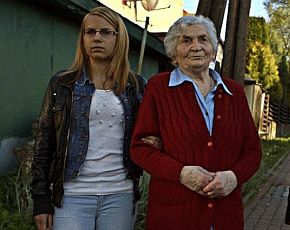
“800 Jews From Our Town,” a documentary about the School of Dialogue program in Bircza, directed by Filip Luft, will have its TV premiere tonight! It will be shown by a Polish TV channel, Stopklatka TV [LINK].
Marcin John January 26th, 2017
Posted In: EN News 2017
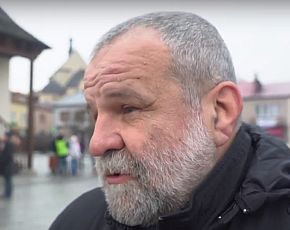
Each of the School of Dialogue programs outside Warsaw ends with a walking tour following the footsteps of the town’s Jewish community. During the tour students become guides for a local audience of their choice. Each program impacts the local community in its own way. Have a look at a clip documenting the final tour in Pilica which took place in December 2016, and listen to what some of the students and participants thought about the experience.
The project is co-financed by the Conference on Jewish Material Claims Against Germany and Friends of the Forum.
Marcin John January 13th, 2017
Posted In: EN News 2017
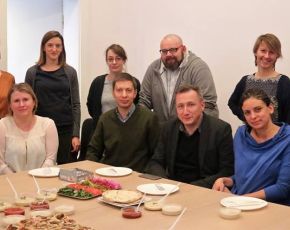
In a friendly and festive atmoshpere, the Forum for Dialogue office team sat together in our conference room to talk about our achievements and plans for the future. It was good to catch up and reflect on our mission.
We would like to wish all our friends and supporters a Happy New Year, hoping that 2017 will bring new opportunitites for connections and dialogue!

Marcin John December 30th, 2016
Posted In: EN News 2016
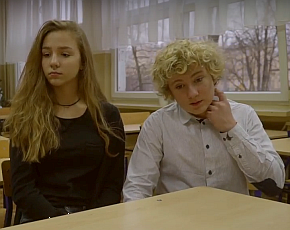
Take a look at this short film about the efforts of the students in Sosnowiec, who upon completing the School of Dialogue program, decided to commemorate the Jewish victims in their town. Guided by the feeling of responsibility, the students obtained a permit from the local authorities and raised the funds to install the plaque commemorating the anniversary of the execution of Jewish people. It’s overwhelming to see young students wanting to make a lasting change in their local community.
Congratulations for this important initiative!
Marcin John December 28th, 2016
Posted In: EN News 2016

In 2014, we celebrated the 25th anniversary of political, economic and social transformations. To celebrate the 25th anniversary of first free elections and the opening of POLIN Museum of History of Polish Jews, Forum for Dialogue prepared an outdoor exhibition about the breakthrough transformations in Polish-Jewish dialogue. The exhibition was open for a month and located in front of the newly opened POLIN museum. The past 25 years have been a time of political, economic and social changes.
Polish-Jewish relations were undergoing transformations alongside those taking place in Poland. In 1989, almost half a century since the Holocaust and after decades of communism, free Poland inherited closed borders, lack of diplomatic relations with Israel and incapacity to hold a public discussion on any topic related to the history of Polish Jews. Poland today is a completely different country. There is still much to do, but many are willing to be the doers. Their hitherto accomplishments deserve to be acknowledged.
The exhibition presented the wealth of initiatives undertaken over the course of the past quarter of the century. These have been grassroots and top-down in character, local and nationwide, happening both in small towns and in large cities. The exhibition presented the achievements of youth involved in School of Dialogue program, which is meant to open young people’s eyes on what has been forgotten – i.e. the Jewish history of their hometowns.
The exhibition also presented selected personal stories of Leaders of Dialogue – individuals involved in Polish-Jewish dialogue who work to preserve the Jewish heritage in their towns. They change the world around them, often overcoming obstacles and indifference.
Finally, the exhibition touched upon the topic of Polish Jews who come to Poland and confront their perceptions of the country with today’s reality and discover a shared yet complicated past. Thanks to School of Dialogue, they meet young Poles who become their local guides.
The project is co-financed by the Department of Public and Cultural Diplomacy of the Polish Ministry of Foreign Affairs as part of the 2014 edition of the competition Cooperation in the Field of Public Diplomacy. The present publication presents the opinions of its author and cannot be equated with the official position of the Polish Ministry of Foreign Affairs.
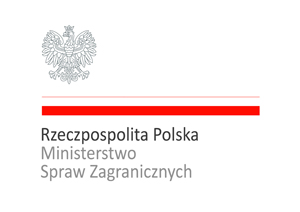
Marcin John October 12th, 2016
Posted In: EN Programs Archive

Forum for Dialogue wanted to make young people aware of the sites related to Warsaw’s Jewish history. For this reason, our organization was the first to offer tours of Jewish Warsaw for high school students. There were four routes to choose from: tour of Jewish cemetery at ul.Okopowa, tour of the area around pl.Grzybowski, tour of the former ghetto area and tour of Jewish Praga. On what street did the synagogue stand in Praga district? How did the ghetto borders run? What was Próżna street like before the war? “I don’t know” would be the answer to these questions by most of Warsaw’s high school students. To gain knowledge in this subject matter, teenagers were invited to experiential history lessons that presented the forgotten Jewish side of Warsaw. The tours were meant to acquaint young people with sites connected to the city’s Jewish history. These outdoor activities were more than mere field trips or history lessons; a significant part of each tour focused on group work of the students with sources provided by the organizers. The tours have now become an integral part of School of Dialogue Warsaw program. Tour routes:
“Stories Behind the Stones” is a tour in the course of which students explore the area of Warsaw’s Jewish cemetery, working with visual aids in the form of photographs and material objects. The tour acquaints students with specifics of Jewish tombstone symbolism, introducing them not only to Jewish culture, but also biographies of famous people buried at the cemetery. Much is to be gained from a cemetery visit in Warsaw, a city that was almost completely destroyed, especially when it is a large preserved cemetery; this is the best testimony to the richness and diversity of Warsaw’s Jews.
“Próżna Now and Then” gave tour participants the opportunity to explore the only street that survived the Warsaw ghetto before its renovation.
Using source documents, students attempted to reconstruct the landscape of a typical prewar Warsaw street and learned about traditions and customs of Polish Jews.At the same time, they searched for traces of the past in the contemporary street layout. The tour included a visit to the synagogue and an activity on Jewish religious holidays, where participants would use auxiliary materials to learn about the origins of the different holidays, customs and rituals connected to each of them as well as the traditional foods that are prepared for the given festivity.
“Jewish Praga” presented the unknown history of this district of Warsaw. The tour allowed participants to get acquainted not only with important events for Praga’s Jewish community, but also to visit sites testifying to Jewish presence in the district. The tour itinerary included a visit to Praga’s Jewish cemetery. Forgotten and often overlooked in the social memory of Praga residents, it is the oldest Jewish necropolis in Warsaw. Thanks to this walking tour, participants discovered sites buried in oblivion, but still testifying to Praga’s Jewish past.
“A Walk Through a Perished City” was based on an original concept of an urban game on the grounds of what used to be the Warsaw ghetto, which was delineated on maps that made students realize that the closed Jewish district existed in places many of them pass through on a daily basis. Subsequent stops within the “ghetto borders” were connected to various source texts about living conditions in the closed district and the fate of Warsaw’s Jewish community during World War II.
The program was implemented between September 2006 and Fall of 2007.
Marcin John October 10th, 2016
Posted In: EN Programs Archive
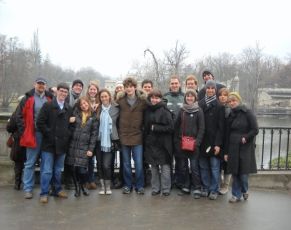
Between March 15 and 22, 2009, Forum of Dialogue, in cooperation with the American Jewish Committee, Ministry of Foreign Affairs and Consulate of the Republic of Poland in New York, organized a study visit for ten students from the prominent American universities including Columbia University, Jewish Theological Seminary, Princeton University, Tufts University and New York University.
The aim of the program was to educate young Jews about the history of Polish-Jewish relations, as well as the current state of affairs. The visit was also an opportunity to get to know their Polish peers, establish personal relationships and confront the complicated past. The program also allowed participants to meet with prominent journalists, scholars, politicians and members of Poland’s Jewish community.
An important feature was a workshop for young Jews and Poles on the topic of Polish-Jewish relations. The workshop approached the questions of Jewish settlement in Poland, anti-Semitism, Polish and Jewish experience of the Second World War and the Holocaust, the interaction of Polish and Jewish culture, and the current Polish-Israeli affairs. Students also discussed the postwar history of Polish Jews, questions of historical responsibility and the current discourse concerning that subject matter. Another equally important issue concerned the Jewish revival in Poland, as well as the efforts to preserve the memory of Polish Jews.
For many of the participants this was the first trip to the country of their ancestors. Therefore, it was an opportunity to explore their roots and confront their ideas of Poland with reality.
The visit in Poland was a very inspiring experience. The well-crafted program showed us Poland through the eyes of Poles, allowing us to fully understand this country’s history and culture. We were allowed to draw our own conclusions about Poland, and the organizers made sure that we had access to educational materials and meetings with experts, maximizing the value of our trip. I also appreciate the hospitality of Poles with whom we traveled and shared our experience. For me it was also an opportunity to explore my family history and the history of Jews in Poland.
Workshops participant
Marcin John April 1st, 2016
Posted In: EN Programs Archive
